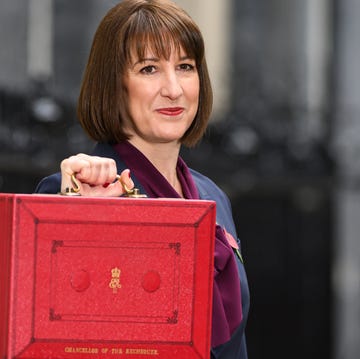Are you owed a state pension payout? Around 134,000 married, widowed or retired women have missed out on thousands of pounds of basic state pension thought to total in excess of £1bn, following systemic underpayment of their state pension dating back as far as 1985.
They should be entitled to a payout, but the Department of Work and Pension's handling of the situation has been dubbed a 'shameful shambles' by the chair of the public spending watchdog, the Public Accounts Committee (PAC).
“For decades, DWP has relied on a state pension payment system that is clunky and required staff to check many databases - and now some pensioners and the taxpayer are paying in spades," said PAC chair Dame Meg Hillier MP.
What to read next
"Departments that make errors through maladministration have a duty to put those it wronged back in the position they should have been. In reality DWP can never make up what people have really lost, over decades, and in many cases it’s not even trying. An unknown number of pensioners died without ever getting their due and there is no current plan to pay back their estates."
The PAC says:
- Small errors went unnoticed, which led to the underpayment of 'significant sums' over time
- Little guidance has been issued for those who think they may have been affected
- There is currently no plan in place to contact the next of kin of deceased pensioners who may have lost out
Underpaid state pensions
The issue was first highlighted last year by former pensions minister Steve Webb, partner at financial consultancy Lane Clark & Peacock. He tabled a freedom of information request last year, which revealed the underpayments.
Details of the underpayments previously released by the Department for Work and Pensions (DWP) estimates that the total bill for tackling the issue will be about £2.7bn. An average of £13,500 will be be paid out to each pensioner who has been affected. For those who are owed payments but have died, the money will be paid to their beneficiaries.
The DWP has set up a special unit to investigate the issue and review hundreds of thousands of cases, which could take some time to complete.
"The scale of these underpayments is truly shocking. Whilst it is good that the government is now planning to address this issue, the plan to do so over five years is simply not fast enough," Mr Webb told the BBC.
"It is also quite shocking that DWP plans to stop paying interest on these underpayments. If the government is going to fix these problems, it needs to do so swiftly and fairly."
Who’s affected?
One big group of women who have been affected by decades of underpayment are married women who reached state pension age before 6th April 2016.
Under the rules of the ‘old’ state pension system, married women were entitled to a state pension worth 60% of their husband’s basic state pension when he reached age 65.
This was because when the state pension system was first set up, many married women didn’t qualify for a full basic state pension in their own right, typically due to a reduced national insurance record. So they were given an additional ‘uplift’ or ‘top up’ to the 60% level when their husband turned 65.
What was the problem?
Many married women didn’t actually get this top up.
While they should have got it automatically if their husband turned 65 on or after 17 March 2008, a ‘glitch’ at the government end means they may have missed out. Where this is the case, women can claim back any unpaid state pension, which can be backdated to their husband’s 65th birthday.
Women who fall into this category should receive their pension top up automatically and will be contacted by the DWP in the coming months.
However, things won't be this simple for everyone. For women whose husband turned 65 before 17 March 2008, claiming the ‘uplift’ was more complicated because, after receiving any basic state pension in their own right, they would later have to claim for the ‘uplift’. If you think this situation applies to you, you’d need to contact the Pension Service to make your claim, but any underpayment you can claim can only be backdated for twelve months.
“The group I’m more worried about are the ‘pre-2008’ people where the wives had turned 60, and their husbands reached 65 before 17 March 2008, but the wives didn’t know they had to make a second claim”, says Steve Webb. “So the law got it wrong and now when they make a claim, it can only be backdated for a year.”
In this case, you should complain to the DWP and to the Parliamentary Ombudsman, Webb advises.
How to claim
Check if you were underpaid using this free underpayment calculator tool from Lane Clark & Peacock. You’ll need to put in a few details about yourself and your husband to get an idea if you’ve been underpaid.
If it looks like you may have been underpaid, the next step is to call the Pension Service on 0800 731 0469 - there should be a specific menu option for underpaid state pensions.
You can’t claim for any underpayment online, this can only be done by phone and it may take a while to get through, so do be persistent.
How much can you claim?
There’s no ‘one size fits all’, as any underpayment depends on your own circumstances, but in some cases, it could be thousands of pounds.
“The average payment is around £10,000 for the eighty or so very detailed cases I’ve been looking into”, says Webb. “The cost to the DWP in payouts could well run to over £100 million”.
Who else may be owed money?
Many more women may also have been underpaid on their basic state pension for a variety of reasons.
These groups include:
- Divorced women, who may not benefit from their ex-husband’s national insurance record. However, these claims cannot be backdated.
- Widows whose basic state pension didn’t go up after their husband died, or who may have been underpaid while their husband was alive.
- Women over 80 with a basic state pension less than £80.45 a week. This applies regardless of whether you’re single, married, divorced or widowed and relates to an ‘over 80’s’ pension top up.
- Families and heirs of women who have now died, but who may have been underpaid on their state pension while they were alive. This payout won’t be made automatically – you’ll need to contact the Pension Service.
If you'd like more great money reads, SIGN UP HERE for our fortnightly Financially Fabulous newsletter!













